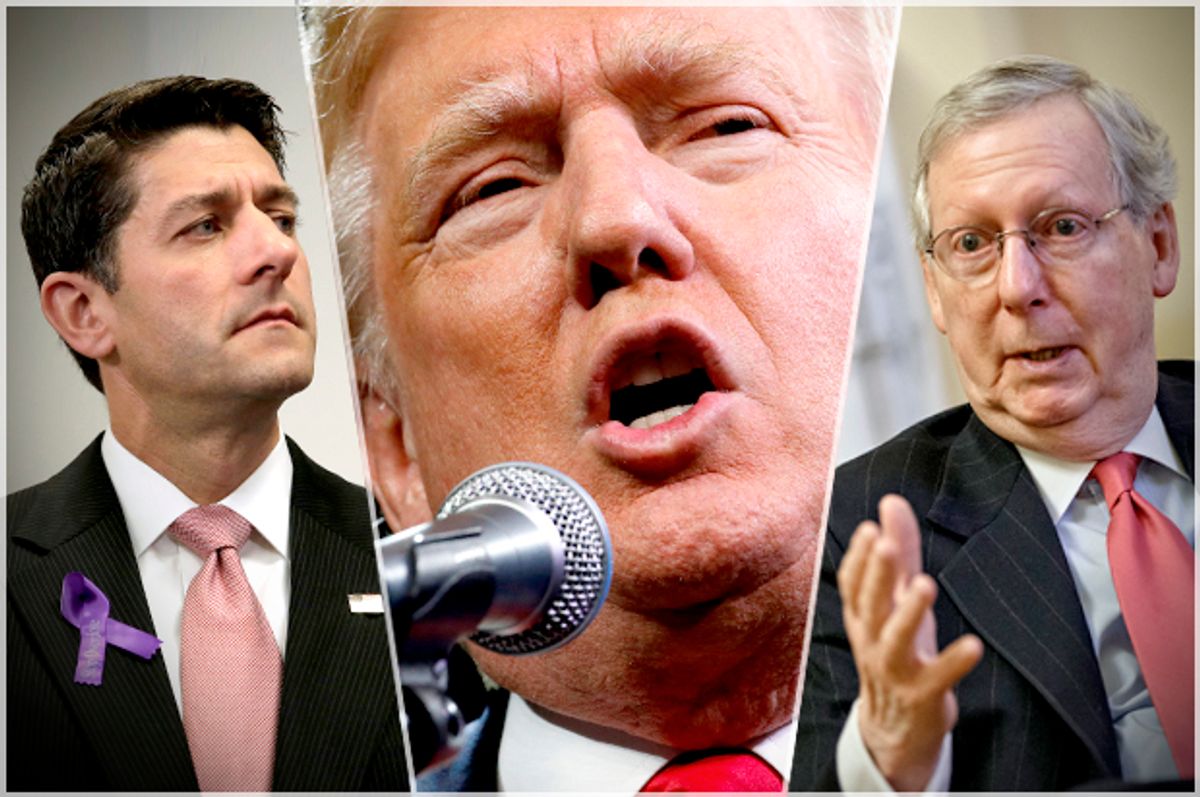For months, President Donald Trump and his advisers have been promising a tax-cut proposal that was built to impress. Needless to say, that didn’t quite happen when Treasury Secretary Steve Mnuchin and the president’s top economic policy adviser, Gary Cohn, unveiled a single-page outline at a Wednesday news conference.
Liberals mocked the White House claims that 100 Treasury staffers worked on such a flimsy document. Some congressional Republicans are worried that Trump's plan might increase the federal budget deficit, while their Democratic counterparts complained that they were not consulted and condemned the outline as being filled with giveaways to the ultrarich (including Trump).
All that said, it’s still more likely than not that Trump will manage to pass a large tax cut through both houses of Congress. There are several reasons why.
[jwplayer file="http://media.salon.com/2017/04/cd88f9ff4f33d320fa243137415ac33e.mp4" image="http://media.salon.com/2017/04/8fbc2a93aa99dd592da0298467402bab-1280x720.png"][/jwplayer]
1. The administration appears to have learned its lesson from its health care debacle. While Democrats made sport of the skimpy nature of the tax-reform proposal, its release is probably a better way to begin negotiations than relying on the behind-closed-doors process that Trump let House Speaker Paul Ryan use when he was creating the American Health Care Act. A rough statement of principles allows for much more wiggle room for the president.
2. Democratics aren’t needed to pass a big tax package. Democratic leaders Chuck Schumer and Nancy Pelosi almost certainly won't be fans of whatever ultimately emerges from the legislative sausage factory. But because the bill is about revenue, under Senate rules the Democrats will be unable to filibuster it. Republicans can pass the law with a simple majority. They have 52 votes already, and Vice President Mike Pence stands ready to break a tie if necessary.
3. Cutting taxes is much simpler than overhauling the health care industry. During the past several terms that the GOP has controlled Congress, it has demonstrated little interest in the nuts and bolts of government policy creation. The party’s recent health care embarrassment illustrated this circumstance perfectly.
While Barack Obama was president, both houses of Congress under Republican control repeatedly passed bills to “defund Obamacare” with little regard for what they would have actually done. Some GOP lawmakers even entertained the delusion that Obama would join them in dismantling his signature achievement if they shut down the government. It didn’t work at all.
Once Trump took office, congressional Republicans suddenly realized they had never bothered to come together on a health care plan that was politically prudent and that could attract enough votes to pass. The hastily constructed AHCA didn’t stand a chance once it was eventually trotted out.
The reality about taxes, however, is that while more sectors of the economy are likely to be affected, this is a simpler subject than health care. While the White House is entertaining dreams of ripping up and replacing large sections of the tax laws, it will be more than happy to settle for a big reduction that doesn’t attempt to rejigger the excessively complicated Jenga tower that is the U.S. tax code.
4. Republicans love cutting taxes. The GOP is deeply fractured on many issues, largely because its grand ideological goal of slashing government has never been attainable. Almost no respondents to polls have ever been interested in massive reductions in government spending. Even Republican voters have never been keen on the idea.
Cutting taxes, however, is something that all Republicans can get behind. As the late conservative pundit Robert Novak loved to quip, "God put the Republican Party on earth to cut taxes. If they don't do that, they have no useful function."
Minimalist government types like Sen. Ted Cruz love tax cuts. So do more corporate-friendly Republicans like Sen. Lindsey Graham.
Reducing taxes is also fundamental to Republican electoral strategy, as former Reagan administration economic adviser Bruce Bartlett has pointed out. According to conservatives, Democrats can be elected by promising to spend more on the people. The “free money” of government spending is like Santa Claus. But with tax cuts, Republicans can get in on the Santa act as well.
If you can get enough Republicans to stop worrying that tax reductions might decrease government revenue and thus not pass muster as fiscally conservative, you can essentially guarantee unanimous GOP support for tax reductions. That battle happened long ago. The true fiscal conservatives effectively threw in the towel after George H.W. Bush lost his re-election bid in 1992. Thereafter, any Republican who came out against tax-cut bills in their final form was almost certainly signing his or her own death warrant.
Democrats have understandably seized the opportunity to mock the GOP for the White House’s single-page handout in place of a fully developed legislative proposal. But there are many reasons to expect that when it comes to tax policy, Trump and the Republicans will get the last laugh — at least for now.

Shares